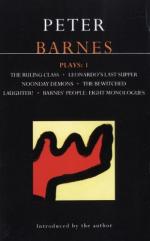|
This section contains 730 words (approx. 2 pages at 400 words per page) |

|
Juvenalian Satire
Satire's goal is to effect social improvement or at least chastisement for the follies of human nature. Although Barnes has stated that "nothing needs changing when it's all a joke," satire uses humor as constructive criticism. In The Ruling Class Barnes ridicules the pretensions of the upper class by exaggerating their pompous behavior to the point of absurdity. Thus the Thirteenth Earl carries the eccentric behavior of the stereotypical British lord to a ridiculous extremeself-hanging as excessive masochism. Barnes's form of satire is known as Juvenalian satire, named for the Roman satirist Juvenal whose biting satires exposed the vices of the Roman elite. Horatian satire, named for Horace,is gentler and more urbane. Juvenalian satire confronts its target viciously, with anger. In Barnes's version of this, no one is safe: from the bloated and sputtering Sir Charles and his dim-witted son, Dinsdale, to the grumbling butler...
|
This section contains 730 words (approx. 2 pages at 400 words per page) |

|




